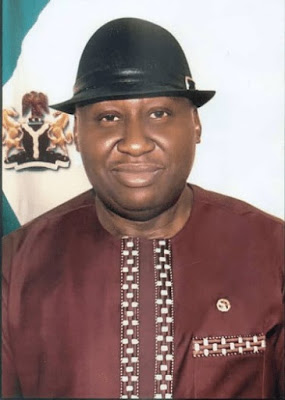 |
| Commodore Emmanuel Effedua(Rtd.) Rector, Maritime Academy of Nigeria, Oron, Akwa Ibom |
storm, several suggestions have emerged from discussions at the Global Maritime
Security Conference, on the security of the GoG as it remains very important to
global trade.
In this interview with Commodore Emmanuel
Effedua(Rtd.), Rector, Maritime Academy of Nigeria (MAN) Oron, Akwa Ibom, he talks
of the strength of the Navy in combating piracy and other crimes at sea; the
fact that perpetrators of the crimes at sea return to land after their
operations; the multi-dimensions of the threats and how a multi-pronged
approach including collaborations can offer long-sought solutions.
engagement of locals in form of collaborations, ensure more secure shipping?
evolving, so you cannot easily say one plus one equals two. For example, there
is no maritime crime that takes place in water that did not have its origin on
land, e.g those people who go to hijack ships, they don’t remain at sea. They
take hostages and bring them back on land. Yes, maybe locals could be involved
in some intelligence there, to tell people where they can locate people who
were kidnapped. But that is just a minor part of it. The most important thing
is to prevent the untoward occurrence from taking place in the first place.
be the strength of the Navy platform for operations against piracy and other
crimes at sea?
deployed will be enough. The Nigerian Navy has a lot of platforms, but it is
still insufficient. Running a Navy is very expensive. It is not like the way
the other Armed Forces are run. Not that those ones are not expensive too, but
that of the navy is huge. The cost of building a ship is big; a very complex
ship can buy more than 40 aircrafts. But it is just one, while the aircrafts
are more. The beauty of the aircraft however, is that it can carry out the
search of a wide area within a short time, but intercepting and arresting has
to be the job of the navy.
of communication and collaboration to handle piracy problems?
sense that you require less manpower. Though more expensive, it is more
efficient. All they need to do is, if they intercept any untoward activity at
sea they report back to the maritime headquarters that so and so is happening
out there, they don’t know what it is, but a surface ship should be sent there
to find out what is going on, so it becomes easy to arrest. Like what you call
the ‘Falcon Eye’ that is what the C4i is riding on, the navy has that already.
It is like you compiling a surface picture of an environment, in this case, the
maritime space. At any point, we know where every vessel is. When we know where
they are, we positively identify them to NIMASA. NIMASA being the lead agency
has the technical knowhow and all information about that vessel; where it is
going, point of origin, where it is going and what it is carrying and when it
is supposed to berth. So, if it does not berth when it is supposed to berth,
then you know something is wrong. Then, the navy can tell you the path it has
passed through, where it stopped and where it is right now. From there we can
follow-up and investigate and know what they are doing. So, in case of those
who divert products or those who engage in illegal bunkering, it is becoming
easier now to pin them down and track them. I think that is just the way
forward. What we have now is even more than C4i. It is now C5i, because we now
have Command, Control, Communications, Computer and Collaborations is included.
Already in NIMASA, we have that collaboration; NIMASA, Navy, NPA and maybe at
some point NIWA.
global outlook with regards to efforts at fighting piracy?
Maritime Security Conference must hold. This is because we have a problem in
our maritime space, the world knows of it and some people are making a lot of
noise about it, while some are actually turning it into a political weapon
against Nigeria. Sadly, some unpatriotic reports are done based on hear-say.
The IMB would note them down, and at the end of the day they say okay, this is
what is happening in your place. That is why some countries now insist on
taking war insurance to bring cargo to Nigeria, which makes goods very
expensive. Remember, it is the end-users who suffer it. In essence, the same
magic the Western World did for the Gulf of Aden when the Somalia crisis was so
high; kidnapping, the Indian Nation, piracy number one, the Strait of Malacca
very dangerous, they brought in their naval assets and had all countries
collaboration and they were able to address the problem. The Gulf of Guinea is
a very important maritime space and they cannot afford to look away. Now that
we have shouted and told them we have a problem, we want you to come and advise
and also help, it will not be easy for them to criticise us anymore, because we
have told them our major challenge. So, where they fail to help, they take the
blame.
